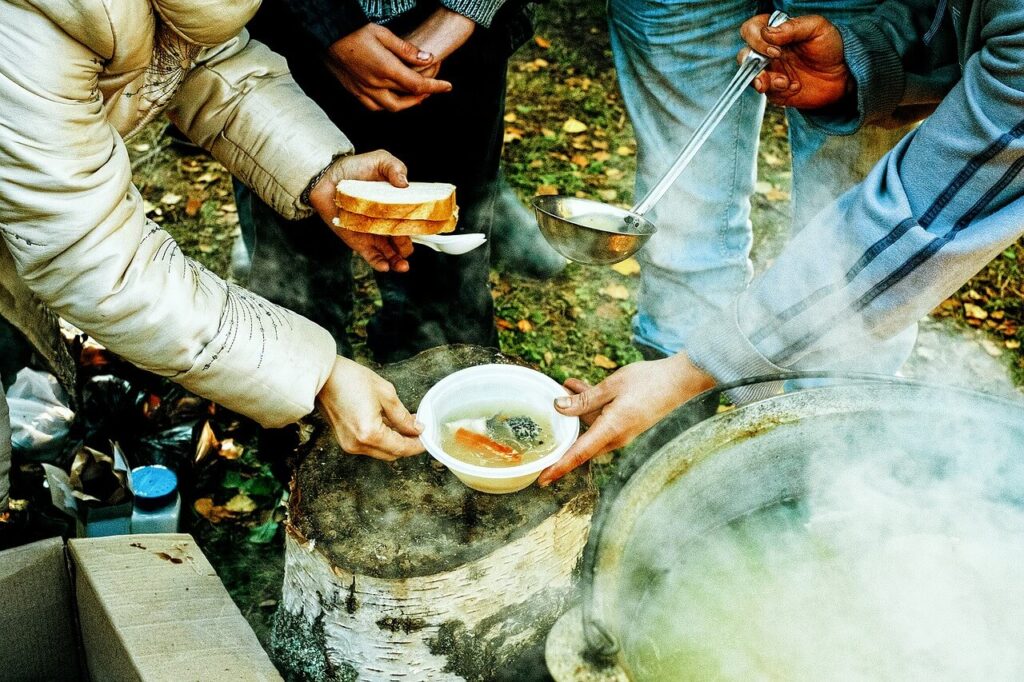When did we lose sight of our responsibility to care for the vulnerable among us? I’m not sure if it happened in the early days of Christianity separating itself from Judaism, or much later after the Great Awakenings in U.S. history. Or, maybe, the mandate to care for the vulnerable among is repeated so often in scripture because it doesn’t come naturally to us. Maybe we need to be reminded that any abundance we have is meant to alleviate the suffering of our neighbors.
In John’s account of the feeding of the 5000, Philip recognized that there was no way to buy bread for all the people, and they were hungry. Jesus, in asking Philip how this was to be done, showed the limits of human insight and creativity, and, quite frankly, trust in God. Philip and the other disciples would have been content to walk away and let the crowd fend for themselves. Jesus alone knew that feeding the hungry was possible. Five loaves a bread and two fish went a long way that day.
I have no doubt that they could have been literally multiplied by the power of God. That would be a definite miracle. What if it was a miracle of another kind? What if the people gathered there shared what they had rather than keeping it for themselves to eat at a later time? What if the child who had the five loaves and two fish inspired them to also offer up what they had? We wait for God to feed the hungry and repeat the miracle of the loaves and fish. What if this story is all about us becoming the miracle by sharing our resources with the most vulnerable in our communities in a way that leaves no one hungry?
It’s no coincidence that John follows this story with the account of Jesus walking on water. The disciples saw a figure coming toward them and they were terrified. Who wouldn’t be? But Jesus calls out to them and tells them not to fear. Generosity puts the power of God on display and something in us huddles in fear. Jesus is still calling out to us. “I AM. Fear not.” God is present in generosity and love. God multiplies abundance and ensures that all are fed. Our response is often to withdraw in fear.
However, if we can overcome the fear we get to where we are going fairly quickly; we become the embodiment of Christ we seek to be. The boat lands on the shore and the miracles of abundance and generosity continue without hinderance.
Both these stories could have happened exactly the way they are written. I have no doubt that multiplying loaves and fish and walking on water are within God’s power. However, I also believe that these stories have more power than just the possibility of what is contained in the literal interpretation. These stories remind us that fear has no place is generosity and sharing of God’s abundance.
We have been taught that we earn what we have and that we deserve the benefits of our success. With all the inequities in our society, there is no way this can be true. Think of all the people who do not have access to quality education, adequate food, save housing, medical attention, mental health care, etc. Those of us who have these privileges and call ourselves Christians, have no business being self-focused and fearful of having less than we think we deserve. The power of God is made manifest in very real ways when we live generously. There is no room for fear. Generosity magnifies abundance; it does not lead to scarcity.
Isn’t time we heed Jesus’ words and stop living in fear and start living in generosity? There are enough resources to feed, house, clothe, educate, and care for every human being on this planet. Yet, we continue to believe the narrative of the Empire that only wants the rich and powerful to become more of both. The narrative of our faith is to live generously and create abundance in caring for the vulnerable among us. Imagine how justice would flow if we all lived what we say we believe…
RCL – Year B – Ninth Sunday after Pentecost – July 25, 2021
2 Samuel 11:1-15 and Psalm 14 • 2 Kings 4:42-44 and Psalm 145:10-18 • Ephesians 3:14-21 • John 6:1-21

